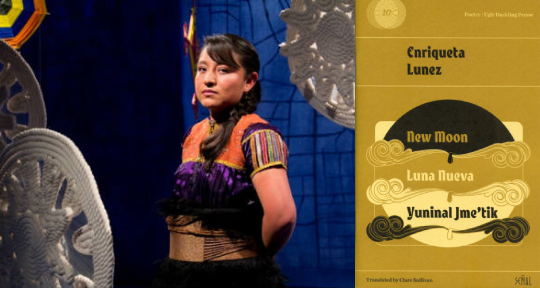New Moon/Luna Nueva/Yuninal Jme’tik by Enriqueta Lunez, translated from the Tsotsil by Clare Sullivan, Ugly Duckling Presse, 2019
Although there is an increasingly large corpus of Latin American Indigenous literature in translation, these translations seldom make it into print. While the digital medium offers advantages—global circulation, the ability to include audio and video of spoken word performances, the capacity to cheaply reproduce multilingual volumes—print remains a vital avenue for the publication of these works as in many circles it still possesses a prestige that digital lacks. Within Indigenous literary movements themselves, authors tend to set print publication of their works as an important goal, even as they clearly value digital publication as an important and effective tool that facilitates their ability to reach a global audience. Most Indigenous literatures that do make it into printed translations do so in anthologies such as Miguel León-Portilla and Earl Shorris’s In the Language of Kings (2002), Allison Hedge Coke’s Sing: Poetry from the Indigenous Americas, or Nicolás Huet Bautista and Sean Sell’s Chiapas Maya Awakening: Contemporary Poems and Short Stories (2017).
Published in December 2019, Clare Sullivan’s translation of Tsotsil Enriqueta Lunez’s work in New Moon/Luna Nueva/Yuninal Jme’tik, is perhaps only the third single-author volume of an Indigenous writer from Latin American to be published in English translation, the other two being Sullivan’s translation of Zapotec poet Natalia Toledo, The Black Flower and Other Zapotec Poems (2015), and Nathan C. Henne’s rendering of the Kaqchikel writer Luis de Lión’s Time Commences in Xibalbá (2012). Although the publication of these works over the last decade demonstrates how little Indigenous literature has been translated and how much more work there is to be done in the area, it also shows that interest in reading these authors in translation is slowly gathering steam, as Wendy Call’s translation of selected poems by the Zapotec poet Irma Pineda, In the Belly of the Night and other Poems, is due out later this year from Pluralia. In other words, New Moon speaks to the increasing prominence of these voices in the global literary market.

